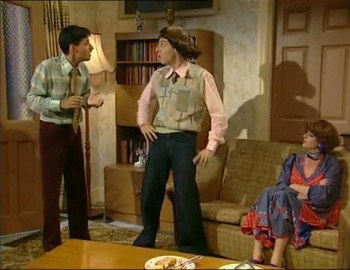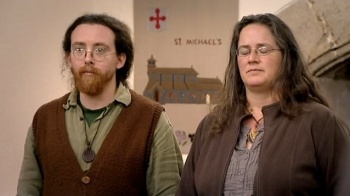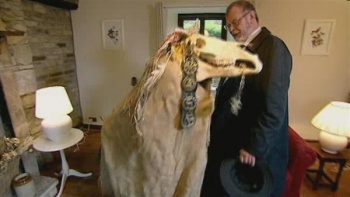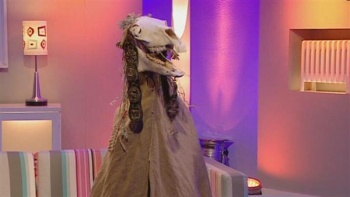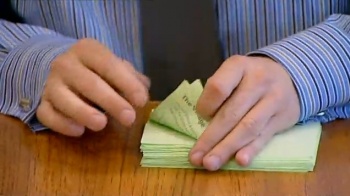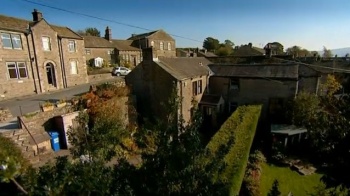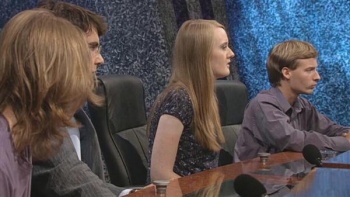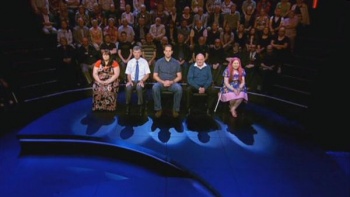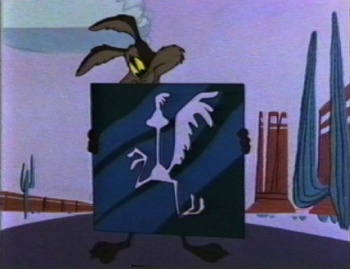Weaver's Week 2011-04-03
Last week | Weaver's Week Index | Next week
Something of an unusual Week this week. Rather than arguing directly, we're putting forward a review by allusion and inference. We're not going to explain it all. Other than to point out that all of the names, locations, and shows in the following review are fictional.
Contents |
Them Next Door
Celfau Cig Oen, Channel 4+1, 10.03 Thursdays (3-31 March)
4Poorer, 9pm Fridays (1-22 April)
The town of Bucolia, in the county of Braughset, lies partway down the Loaph valley. Recorded in the Domesday Book as "Bere Coll", it received a royal charter to hold a market in 1279. Though the market ceased trading in the early 20th century, the cobbled Market Place remains the heart of the settlement, and is lined with restaurants, guest houses, and a chintz shop. The Loaph valley is home to many limestone quarries, and the town grew rapidly after the railways arrived in 1885. Today, it is a tourist attraction in its own right; the town has about 1400 inhabitants and hotel space for just over 100. It is best-known as the gateway to the wooded Sussock Hills, and the annual Bucolia Culture Festival attracts such stars as the jazz musician Cecil Jordan and the comedian Sam Fitzpatrick.
Into every life a little rain must fall, and Bucolia is no exception; its annual average rainfall of 641mm is almost half as much again as the leeward side of the Sussock Hills. The summer showers were given added potency during 2010, when a group of television producers descended on the town. With their television money, they'd bought Foxglove Cottage, a three-bedroomed house with a green garden, walls, windows, three doors, and a roof. To any normal purchaser, this would cost about £200,000, but the estate agents were able to strike a good deal with the television people and sell the cottage for a mere £260,000. A snip!
The house is the formal prize in the game of Them Next Door, not to be confused with the faintly racist 1970s comedy. But if we're to believe the show, the actual prize is the location and the community. Come live here! It's picturesque! It's a Real Community! Ah, what is a real community? According to the television producers, it's insular. Wary of outsiders. Fearful. Under threat from outsiders who will steal their crops and burn their houses, or something.
That's the first problem: Bucolia simply isn't like that. It treats newcomers, like tourists, like everyone, with respect. True, there aren't that many new faces in the town, but nor are there that many faces full stop. There's someone moving in every couple of months, and they fit into the community as it evolves. The claim – repeated at the start of every show – that "you have to have three generations in the churchyard before you're a local" is a joke. It's humour. It's not to be taken seriously. Clearly, the distinctive Braughset sense of mischief has slipped past our television producers.
So, what happens on the game show? Having completely misrepresented the village, the producers introduce two couples, plus any dependents they might have. Each couple will spend a couple of nights in Foxglove Cottage, and a couple of nights in a local bed 'n' breakfast. On the sample episode we saw (17 March), the first couple was Harold and Ethel, who run a small business in Surbiton. They were up against Frank and Valerie, squatters from London.
Even though the show was only two minutes old, we found ourselves recalling the lessons learned from Channel 4+1's long-running programme "The Spreading Chestnut Tree". Readers will doubtless recall how a house was filled with a dozen or so strangers, each carefully selected for their capacity to carry the producers' chosen story. The climax of the show came each Friday night, as host Emmanuel Goldstein walked that week's ejectee in front of a baying mob for their two minutes' hate.
But it's not the walk o'shame that springs to mind, but the casting. Each year, the treehouse was filled with caricatures, carefully selected to push the buttons of the general public. Occasionally, this was a sympathetic picture (remember Glenda, who was deaf?), sometimes (as with Amber Good) the public made their own saints, but more usually it was to create a pantomime villain. Them Next Door does exactly that: every contestant is selected and portrayed because they're different from the producers' preconceptions of Bucolia, and country life in general. Black people in the countryside? It's only a big thing if they've made it one. Gay men? Again, the producers find this more interesting than the townsfolk.
And so it was in the episode we saw. Harold and Ethel brought along their singing pantomime horse Dobbin, and their jester Claypole helped stage a pantomime for the youngsters of the village. Quondam squatters Frank and Valerie were shown enjoying hot running water and central heating, little luxuries that most of the viewers will take for granted; they entertained the villagers with some artwork and a little improvised theatre.
It's clear that the producers expected an awful lot of confrontation. It's equally clear that the finished show delivered approximately none of that ill-feeling. Not that that stopped the producers from trying to present confrontation where none existed. Putting squatters and gays and blacks and people who commune with ghosts into the tranquil English countryside will show the town as it really is. A tolerant and welcoming place, where the community events were met with nothing more than the occasional raised eyebrow, and comments along the lines of "Some other people might have reservations about communing with the undead, but I'm fine with it."
Did the cameras have a moderating effect? The academic research is mixed: researchers from the Criminology Department of the University of Clegheaton claimed this week that "the countryside was, for a number of the people we spoke to, the last redoubt of an old-fashioned Englishness, which they saw as needing to be preserved from the contamination of modernity." We weren't able to deduce from the press coverage exactly how large that number was: for all we know, it could have been a very small minority, or even about two. Certainly the evidence from the programme as broadcast is that such exclusionary views weren't to be seen, and our suspicion is that if they were, they would have been.
Perhaps the only people disappointed with proceedings were the producers. The general tenor of the publicity, and of Richie Branch's voice-over, was "These incomers will shake Bucolia to the core". So, is someone going to go up on the roof of a twenty-floor mansion in the teeth of a howling gale purely to manhandle a spurious plot device? Of course not. All that's going to happen is that there'll be a little papier-mache sculpture, some clowning around with a pantomime horse, and it'll all be rounded off with a bout of bad karaoke.
Even though the producers don't visibly influence proceedings, we can be sure that they influence proceedings. It's not as though there are cameras and microphones everywhere, as on The Spreading Chestnut Tree, but the shadowy influence of the production permeates all activity. The competitors always seem to make televisual activities: building a papier-mache sculpture is an excuse for time-lapse photography, and a pantomime horse never fails to make attractive television. No-one on Them Next Door ever holds a Lexiko night. Or if they do, it doesn't make it to the finished programme.
The contestants and viewers are guided and advised by the producers' visible representative on screen, a retired vet. He's the first person filmed meeting the couples, he conducts a poll of the residents half-way through, discusses the results with the couples, and announces the result of the ballot at the end. This job could have been done by an outsider, but the producers have decided that no, they'd rather have it done by one of the electorate. Would the vicar have been the most obvious choice? Perhaps she would, but by her absence we might conclude that she wanted nothing to do with the project. Nor is that other pillar of the rural community, the Institute of Ladies, seen on screen. No fruit conserve, no "Land of Hope and Glory", not even the bread of heaven.
At the end of the week, there's a ballot, complete with voting papers, a collapsible ballot box, and an earnest gentleman from Electoral Balloting Services. The losers of the public vote are not going to win the competition, the winners must come back and do it all over again another week.
It's clear that the producers have gone into this project knowing the programme they want to make. The bigots of Braughset, or how television cameras are a cure for racism, sexism, gayism, and all sorts of social discrimination. The producers want to be seen as bringers of liberal values to a reactionary backwater.
The only problem is that the townsfolk resolutely fail to play ball. Rather than get upset at the prospect of squatters in their midst, the locals listened to what their visitors had to say. Some may have agreed with the precept that an empty office building is better used to display and create art than sitting there crumbling into dust. Indeed, a thesis might have been advanced that rural Britain needs more affordable housing in order to retain its young people, rather than an artificial scarcity of homes ensuring that only incomers can afford to live there. But this talk didn't fit into the producers' preconceived plan, so it was ruthlessly cut.
A criticism often levelled at The Spreading Chestnut Tree was that the producers went into each series, and even each day, knowing the story they wanted to tell. While it was clear that they'd try to cast some people in particular roles, and tried to influence events and public perceptions, the unscripted nature of the project meant they had to be flexible, react to events, and sometimes had to quietly dismiss their ideas. The producers always said that they never had favourites, and any appearance was either in the mind of the beholder, or a result of unconscious group pressure in the production team.
By contrast, Them Next Door is entirely recorded, so it's possible for the producers to force their views on the viewing public. It's not only their view of the contestants, but their view of the activities they do, of the townsfolk, and of rural society in general. Don't like the way a conversation is going? Leave it on the cutting room floor. Want to present someone in a bad light? Show them talking, then cut away to a distant shot or someone's reaction, so we can't see the way words spoken five minutes apart have been spliced into one sentence. Wish to actively sneer at the townsfolk? Suggest that they're not participating because they dislike the squatters / the hippies / the pantomime horse, and not because they dislike television producers who are only here to misrepresent them.
The bottom line is that Them Next Door is urban Britain sneering at rural Britain with a palpable sense of arrogance and superiority. And then trying to distract attention from the fact that all this is perpetuating stereotypes and myths that are actually disproven by the programme they've made. It's bad television, not just rotten to the core, but rotten *from* the core.
We were very pleased to find that the viewing public agreed, and switched this programme off in their droves. Such was the success of the show that it was promoted from the mainstream Channel 4+1 to its little-watched digital channel 4Poorer, where spectacularly low viewing figures are an occupational hazard. Channel 4+1 is now spending its Thursday nights on acquisitions, home improvements, and other creature comforts.
University Challenge
Semi-final 2: Peterhouse Cambridge v Magdalen Oxford
Something of a surprise in last week's semi-final, when York brought Sheffield's unbeaten run to a surprise end. This week, Peterhouse are in the unbeaten seat, having accounted for Exeter, St John's Cambridge, York, and Queens' Cambridge. Magdalen got here by beating Durham and downing Downing Cambridge, losing to Sheffield, but triumphing over Christ's College Cambridge and Queens' Cambridge.
This is the eighth and final Oxbridge battle this year, and the advantage currently lies with Oxford, 4-3 – the only other dark blue winner of an Oxbridge battle was Merton. The weekend before transmission saw the annual University Challenge boat race, won quite comfortably by the Oxford side, who pulled away around the half-way mark and never looked threatened thereafter.
Academic dropouts are the subject of the first bonus questions; they're picked up by Peterhouse, who recall such failures as Steve Jobs and Albert Heinstein. Geology and furniture is Magdalen's first set of bonuses, and they benefit further as Peterhouse drop a missignal on a question about Magellan. But there's an error from Magdalen, and Peterhouse are perfect on flavours of quarks. Where would you find York university, asked Thumper, who presumably hasn't seen the billing for next week's programme. There's another missignal from Magdalen, and extracts from Queen Victoria's diary. The first visual round is Name That General Election, from a graphic of seats and party share, and Peterhouse Cambridge are ahead 85-40 at the mile post.
The Oxford revival starts here, with a set of bonuses on black swans, then on treachery in ancient Rome. That brings the side to within five points, and knowledge of an author propel them into the lead. Magdalen get in a spin with bits of biology, and the audio round is on librettists for Benjamin Britten's work. On the grounds that Peterhouse haven't scored in this section at all, Oxford have opened up a 125-85 lead at Hammersmith Bridge.
The Cambridge revival starts here, with "Maryan" as an adjective, and the national flowers of various countries. What's the nickname for the South African cricket side? The Not-as-good-as-the-Kiwis? A missignal for Peterhouse allows Magdalen to declare arsenic and claim bonuses on poets, but Peterhouse do know that 1+1=2. Glad we've got that cleared up.
There's a set of bonuses on astronomical distances in multiples of Earth radii to the nearest powers of 10. Is that question also available in English, wonder Peterhouse. Made no sense to us, either; neither did the curious decision to disallow "100" as the answer when Thumper was expecting the exponent, 2. Someone on Usenet suggested this was the equivalent of asking Jenson Button to give the length of a racetrack, in car lengths, to the logarithm against base e. Welcome to the semi-finals, folks! Magdalen get the next starter, and bonuses on cups of tea, and the second visual round, on the flags of British territories. 170-105 is Oxford's lead at the Chiswick steps.
The Cambridge revival continues here, with questions about time zones, including that nasty little question about the bit of Russia on UTC+2. Does Iceland really run on UTC? So it does. Peterhouse are right to start speculatively buzzing, they need to overturn that gap, but a missignal won't help, and Japanese possessions lost after wars is fertile territory for Magdalen. Tectonic plates for Magdalen, and the bonuses mean they need about two more starters. The next one's dropped, but the Oxford side get Most Favoured Nation status, and questions about neologisms. The leitmotif ensures that Magdalen have the game in the bag, though Cambridge have Pushkin and regions of Paris to push up their score. The gong goes during a set of questions about opera arias, and Magdalen has won at a canter, 260-130.
Will Cudmore had eight starters for Magdalen, but a bonus conversion rate of 25/44 is nothing to sniff at. Edward Tait and Ben Slingo made three for Peterhouse, their bonuses were 13/24. Both sides had three missignals, and the overall accuracy was 61/93.
Thumper describes the losers as "one of the smartest student quiz teams in Britain", but it's Magdalen Oxford who come back next week.
Next match: York v tonight's winners
Mastermind
Second round, match 5
Julia Hobbs gets the ball rolling on tonight's programme, and she's taking the comic strip Calvin and Hobbes (1985-96). See what she did there? Created by Bill Watterson, the newspaper comic strip told the story of the imaginative six-year-old Calvin, and his stuffed toy tiger Hobbes. The strip was known for its detailed drawings, and discussed poetry, metaphors, and deep philosophical concepts – that Hobbes appears as a real tiger to Calvin, and a toy to everyone else, is a prime example. Some terribly prolix questions in that set, but the score still reaches 12 (1).
Hamish Cameron is telling us about Aphra Behn (1640 – c 1688). The first woman to make a living out of writing, Aphra Behn was a playwright and novelist. Born in Canterbury, raised with the aristocratic Culpepper family, Aphra married a Dutch-speaking sailor, but he died. Aphra worked as a spy for Charles II in Holland, but wasn't paid and spent time in jail. To pay off her debts, Aphra wrote plays, and subsequently wrote novels; her best-known works are The Rover (1677) and Oroonoko (1684). We have to confess, we had no idea this person even existed until 90 seconds ago, but it's clear the contender did: 9 (0) is the score, and he's a little unlucky to answer just before the buzz.
Lee Holmes is going to tell us about the Life and Career of Ronnie Barker (1929-2005). Born in Bedford, Barker worked the music hall and repertory circuit. His break into broadcasting was in Meet The Floggits (1956), from where he moved on to The Navy Lark, then television's Seven Faces of Jim, and The Frost Report. There he worked with an Edinburgh barman, Ronnie Corbett, but it wasn't until a technical hitch at the 1971 BAFTA awards ceremony meant the duo had to fill that they got their own television show. Barker's other work included Hark at Barker, Open All Hours, Porridge, and its sequel Going Straight. Barker retired in 1988, to spend more time with his family and run an antiques shop in Chipping Norton. No mention of the Mastermind sketch, but 11 (1)'s the final score.
Next! Thomas Perry will discuss Burnley FC (est. 1882). The football club were founder members of the Football League when it was formed in 1888, winning the competition in 1921 and 1960. They won the FA Knockout Cup in 1914, and the Anglo-Scottish Cup in 1979, but are best-known for flirting with relegation almost every year, though they've only gone down a handful of times. The club's famous players include Leighton James of Wales, Billy Hamilton of Northern Ireland, and Clarke Carlisle of Countdown and reigning Britain's Brainiest Footballer. Not quite the best round of the night, but 9 (1) is no slouch.
Finally, Rachael Neiman is going to tell us about John Shuttleworth's radio series. A comic character, created and played by Graham Fellows, Shuttleworth is a singer-songwriter from Sheffield. His tunes are basic keyboard riffs, and much of the humour comes from Shuttleworth trying to succeed in the face of adversity. For instance, his entry for the Eurovision Song Contest, "Pigeons in flight" (even worse than "My lovely horse"), fails to attract the interest of arbiters of taste in the UK or Norway, though Terry Wogan loves it. 13 (0) is enough to take the lead.
Who's on first? Hamish Cameron, our runner-up of the week, took the Scottish Covenanters on 15 October. He picks up correct answers with Brock and Hubble, and the Contents and Not Contents. All that sounds like two firms of solicitors. A contender who doesn't remember The News Quiz? We like his style, it's not been funny in many years. Sadly, there are lots of passes, and the round ends on 16 (7).
Thomas Perry won on 18 February with Freshwater Fish of the British Isles. His subject tonight was local knowledge, as he comes from Rossendale. The blitz gets him off to a good start, and the fact that the films of Norman Wisdom were never banned in Albania is as memorable as it is bizarre. Again, more passes allow his score to move on to 14 (6).
Lee Holmes is next up. We're glad someone's keeping track of this. He won on 25 February with recent British politics, and kicks off with Romeo, then The Damned United and Hyde Park, resorts on the Black Sea. There's Whistler's contribution to the recent Winter Olympics, the work of Stephen Hawking, the composition of a marshmallow. 20 (4) is the target to tilt at.
Julia Hobbs won on 21 January when she took Armistead Maupin. She gets the Blackpool illuminations, the career of Richard Nixon, and some other carp. After a brief pause, the score ticks over further with triage, the meaning of "pukka", and the career of Leona Lewis. The final score is 22 (1).
Which means that Rachael Neiman requires ten to win. She won her heat on 3 September, taking Belle and Sebastian. The Battersea dogs' home, Buddhism, and witchcraft have the score moving, but there are an awful lot of pauses and passes. The triceratops and "Moon River" keep things moving, and the beer widget helps further, but the final score is 19 (3).
All of which means that Julia Hobbs, an administrator from Ilford, takes the fifth seat in the Mastermind final. Who will secure the final berth? Find out next week.
This Week And Next
Good friend of this column Mr. Wile E. Coyote was pleased to read about BBC4's planned Walls Night. "Excellent," he purred to us. "A chance to see best practice in perimeter construction, structures of concrete and brick to divide disparate factions, and in the possibilities engineered by penetration of – and methods of transiting through – these edifices."
Indeed, the press release tells us that a series of special programmes will cover the construction, testing, and deconstruction of walls, with the unexpected use of celebrities as guinea-pigs. That's Connecting Wall Night, coming soon to BBC4. As Mr. Coyote concluded, "There is nothing like a solid wall to make one wonder what is on the other side." Coronation Street, probably.
Nominations have been announced for the Radio Academy Awards, where we see that Just a Minute and The Unbelievable Truth are both up in the Best Comedy category, and Paul Gambaccini's work on Counterpoint is considered in his Music Broadcaster of the Year nomination. Results will be announced on 9 May.
Ratings for the week to 20 March are in, and there's something unusual at work. Not with Dancing on Ice, still top of the pile on 8.35m. No, the surprise comes beneath, where we find Push the Button on 5.55m and Take Me Out on 5.5m. BBC1's opposition was weak, a rugby match of little importance outside Wales, and its top game show was Wednesday's Masterchef, 5.35m. University Challenge topped the pile on BBC2, 3.3m tuned in; Come Dine With Me led on Channel 4, 2.45m there.
There's only so many ways we can say that Celebrity Juice was the most popular digital game show: this week's figure of 1.425m is more than double Come Dine With Me Daytime (625,000 on More4) and Hell's Kitchen Us (620,000 on ITV2). America's Next Top Model had 445,000 on Living, the Only Connect special had 470,000 on BBC4, which is probably a good thing. New Copycats had 340,000 on CBBC, and Cor Cymru brought 48,000 viewers to S4C.
This week's highlight is the University Challenge final (BBC2, 8pm Monday), pitting York against Magdalen Oxford. There's a new run of The Cube (ITV, Sunday 7pm [8pm Scotland]), Mary Nightingale takes over Britain's Best Dish (ITV, 5pm weekdays, not Scotland), there are returns for A Question of Sport (BBC1, Monday night) and Have I Got News for You (BBC1, 9.30 Friday).
It's a new financial year at the BBC, and Russell Davies's review of the radio panel game continues in part two of Let's Get Quizzical (9am and 7pm Saturday). There are new runs of Counterpoint (Radio 4, 1.30 Monday) and The Unbelievable Truth (Radio 4, 6.30 Monday). And, if you like school games in Gaelic, Gleusta (BBC Alba, 6.30 Wednesday) could be for you. We hope to be reviewing that last one in a couple of weeks.
To have Weaver's Week emailed to you on publication day, receive our exclusive TV roundup of the game shows in the week ahead, and chat to other ukgameshows.com readers, sign up to our Yahoo! Group.

